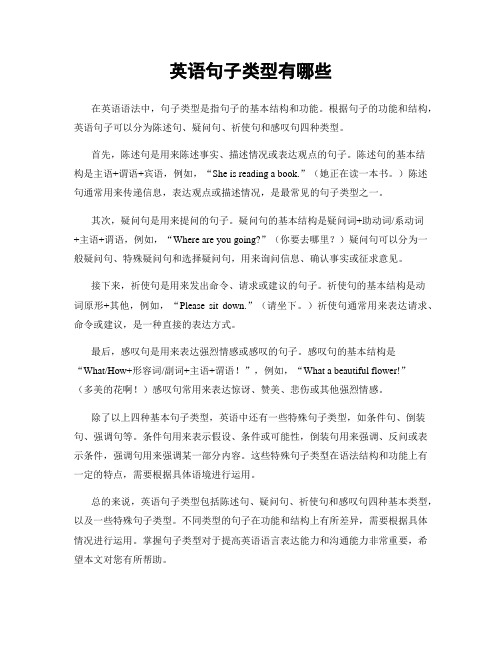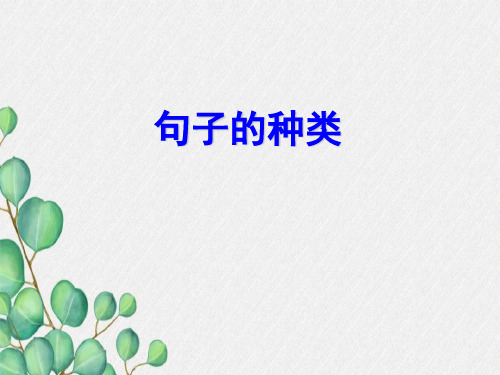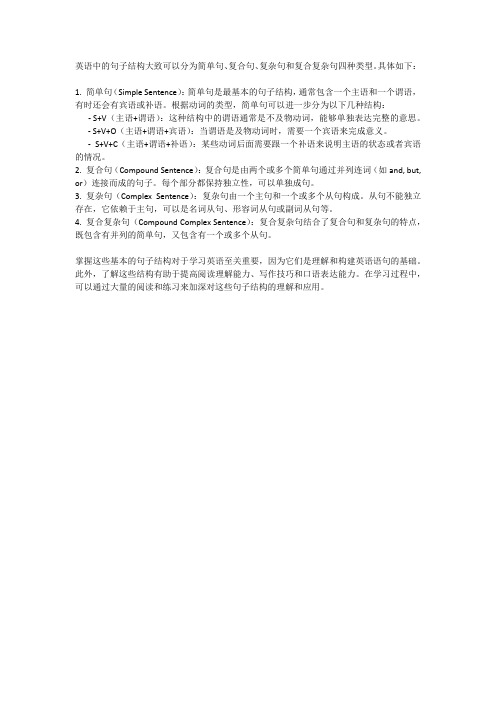英语中句子的种类和基本知识
英语四大句子种类

英语四大句子种类英语四大句子种类指的是英语语法中常见的四种句子类型,它们分别是:简单句、并列句、复合句和复杂句。
这四种句子类型在英语语法中占据着重要的地位,它们在结构和表达意思上都有各自的特点。
下面将对这四种句子类型进行详细的介绍和举例说明。
●简单句 (Simple Sentences)●简单句是指只有一个主语和一个谓语的句子。
这种句子结构简单,表达的意思也较为简单。
例如:●She sings beautifully. (她唱得很美。
)●He loves football. (他喜欢足球。
)●这些句子只有一个主语和一个谓语,因此它们是简单句。
并列句 (Compound Sentences)并列句是指由两个或两个以上的简单句组合而成的句子。
这种句子通过使用并列连词(如and、but、or等)将简单句连接在一起。
例如:●I like coffee and she likes tea. (我喜欢咖啡,她喜欢茶。
)●He is smart but he is lazy. (他很聪明但是很懒。
)●这些句子都是由两个简单句组合而成的,因此它们是并列句。
复合句 (Complex Sentences)复合句是指由一个主句和一个或多个从句组成的句子。
这种句子通常包含一个主语和一个谓语,以及一个或多个从句作为补充信息。
例如:●She believes that he is honest. (她相信他是诚实的。
)●They were surprised when the door opened. (门打开时他们感到惊讶。
)●这些句子都包含一个主句和一个或多个从句,因此它们是复合句。
复杂句 (Compound-Complex Sentences)复杂句是指由一个主句和两个或多个从句组成的句子。
这种句子通常包含一个主语和一个谓语,以及两个或多个从句作为补充信息。
例如:●We know that she is a good student, although she is often late forschool. (我们知道她是一个好学生,尽管她经常上学迟到。
英语语法6之句子的成分和种类

(九)独立成分
与句中其它成分没有语法上的关系的词、短语或固定词组成为独立成分。
独立成分在句中用逗号跟其它成分隔开,它不能脱离句子而独立存在。根据其 表示的意义可分为三种: 1.感叹句—表示说话人的某种感情,长置于句首,有时也可放在句中或句末。 举例:Why,I’ve never seen anything like it. 2.呼语—直接称呼人的用语,用句首、句中或句末,以引起说话人的对方注意。 常用表示人的专有名词表示,也可用普通名词、代词、短语表示。 举例:Quick,boy,go for the tent! 3.插入语—即插入句中的词语或句子,表示说话人对说话内容的看法,态度或 附加的解释,位于句首、句中或句末。通常由副词(短语)、介词短语、不定 式短语,现在分词短语或分句表示。 举例:Most of them,sadly,we never discover. ①有时说完一句话后,如果想补充说明或解释上文,可用破折号引出插入语: 举例:Don't hurry—there is plenty of time.
(三)表语
和系动词一起构成谓语,是名词性复合谓 语的一部分。表示主语的身份、特征或状态, 位于系动词之后。可用作表语的由名词、形容 词、代词、数词、副词、分词、不定式、动名 词、介词短语、从句等。 举例:Genius is one percent inspiration and ninety-nine percent perspiration.
To live is to function. A man without a wife is half a man.
(二)谓语
表示主语的动作或状态,即说明主语“做什么”,“是什么” 或者“处于什么状态”。谓语通常放在主语之后。分为 1.简单谓语—由一个动词或短语动词表示,具有不同的时态、 语态或语气。 举例:Roring waves climb the distant rock.
英语句子种类

英语句子种类一、简单句概念:由一个主语(或并列主语)和一个谓语(或并列谓语)构成的句子。
(一)根据句子的结构,简单句可以分为5种:1、主语+不及物动词He laughs.2、主语+连系动词+表语He is a student.3、主语+及物动词+宾语He loves English.4、主语+及物动词+间接宾语+直接宾语He gives me the book.5、主语+及物动词+宾语+宾语补足语He paints the wall blue.(二)根据句子的功能,简单句可以分为4种:1、陈述句(肯定句、否定句)2、疑问句(一般疑问句、特殊疑问句、选择疑问句、反意疑问句)3、祈使句(第二人称祈使句、第一或三人称祈使句)4、感叹句(how引导、what引导)二、并列句概念:并列句是由两个或两个以上并列而又独立的简单句构成。
两个简单句常由并列连词连接在一起;有时不用连词,只在两个简单句之间用一逗号或分号。
常见的并列句有:1、表示并列,常用的连词有and, not only…but also…, neither…nor…等,前后分句的时态往往保持一致;若第一个分句是祈使句,那么第二个分句用将来时。
2、表示转折,常用的连词有but, yet, still, however…等,前后分句时态一致。
3、表示选择,常用的连词有or, otherwise, or else, either…or…等,前后分句的时态往往保持一致关系;若第一个分句是祈使句,那么第二个分句用将来时。
4、表示原因,用连词for,前后分句时态一致。
5、表示结果,用连词so,前后分句时态一致。
三、复合句概念:由一个主句和一个或一个以上的从句构成。
主句为句子的主体,从句只用作句子的一个次要成分,不能独立成为一个句子。
从句通常由关联词引导,并由关联词将从句和主句联系在一起。
根据从句在复合句中的作用,可分为:1、名词性从句(主语从句、表语从句、宾语从句、同位语从句)2、定语从句(限制性定语从句、非限制性定语从句)3、状语从句(条件状语从句、时间状语从句、比较状语从句、原因状语从句、让步状语从句、结果状语从句、目的状语从句、/ 地点状语从句、方式状语从句)。
英语句子类型有哪些

英语句子类型有哪些在英语语法中,句子类型是指句子的基本结构和功能。
根据句子的功能和结构,英语句子可以分为陈述句、疑问句、祈使句和感叹句四种类型。
首先,陈述句是用来陈述事实、描述情况或表达观点的句子。
陈述句的基本结构是主语+谓语+宾语,例如,“She is reading a book.”(她正在读一本书。
)陈述句通常用来传递信息,表达观点或描述情况,是最常见的句子类型之一。
其次,疑问句是用来提问的句子。
疑问句的基本结构是疑问词+助动词/系动词+主语+谓语,例如,“Where are you going?”(你要去哪里?)疑问句可以分为一般疑问句、特殊疑问句和选择疑问句,用来询问信息、确认事实或征求意见。
接下来,祈使句是用来发出命令、请求或建议的句子。
祈使句的基本结构是动词原形+其他,例如,“Please sit down.”(请坐下。
)祈使句通常用来表达请求、命令或建议,是一种直接的表达方式。
最后,感叹句是用来表达强烈情感或感叹的句子。
感叹句的基本结构是“What/How+形容词/副词+主语+谓语!”,例如,“What a beautiful flower!”(多美的花啊!)感叹句常用来表达惊讶、赞美、悲伤或其他强烈情感。
除了以上四种基本句子类型,英语中还有一些特殊句子类型,如条件句、倒装句、强调句等。
条件句用来表示假设、条件或可能性,倒装句用来强调、反问或表示条件,强调句用来强调某一部分内容。
这些特殊句子类型在语法结构和功能上有一定的特点,需要根据具体语境进行运用。
总的来说,英语句子类型包括陈述句、疑问句、祈使句和感叹句四种基本类型,以及一些特殊句子类型。
不同类型的句子在功能和结构上有所差异,需要根据具体情况进行运用。
掌握句子类型对于提高英语语言表达能力和沟通能力非常重要,希望本文对您有所帮助。
语法课第一讲——英语句子种类

语法课第一讲——英语句子种类英语句子根据功能划分:陈述句、疑问句(一般疑问句,特殊疑问句,选择疑问句,反义疑问句,修辞疑问句)、祈使句、感叹句一、简单句1、简单句的特点:简单句通常只由一个主语(或并列主语)和一个谓语(或并列谓语)构成。
2、简单句的种类:简单句一般分为陈述句、疑问句、感叹句和祈使句四种。
二、陈述句:用来说明一个事实的句子叫陈述句。
它有肯定式和否定式两种形式。
1、陈述句的肯定式:如:①He is a middle school student.(他是个中学生)② I have a hammer in my hand.(我手上有把锤子)③She teaches us geography.(她教我们地理)④The new play was good enough and everybody enjoyed it.(新的话剧非常好大家都喜欢)2、陈述句的否定式:1)谓语动词如果是to be 、助动词、情态动词时,在它们的后面加“not”。
如:①My brother is not a teacher.(我的弟弟不是教师)②He does not have a cousin.(他没有堂兄弟)③I will not go there tomorrow.(明天我不去那儿)④My mother is not cooking a meal in the kitchen.(我母亲现在不在厨房里做饭)⑤You must not make such mistakes again.(你不该再犯类似错误了)⑥We haven’t discussed the question yet(我们还没有讨论那个问题呢).2)谓语动词如果没有上述词语而是其他动词时,须在它的前面加do not(don’t).如:①I don’t know anything about it.(此事我一无所知)②Li Ming does not feed pigs in the countryside.(李明不在农村养猪)③We didn’t expect to meet her right here.(我们没指望着在这里见到她)④We didn’t have a meeting yesterday afternoon.(昨天下午我们没有开会)3)如果“have”作“有”讲,也可以在它后面加not构成否定式,其形式与have got的否定式相同。
英语语法-句子的种类(史上最详细)

(4) 现在完成时和过去完成时的一般疑问句。 将助动词 have/has /had提至句首。 You have known her since your childhood? Have you known her since your childhood? 你从童年时就认识她吗? Yes I have /No I haven’t He had learned English before he came here? Had he learned English before he came here? 他来这之前就学过英语吗? Yes he had / No he hadn’t.
2.感叹句的种类
感叹句一般用what 或how开头,其具体用法如下:
(1) what引导的感叹句 (中心词是名词)
①What +a/an+ 形容词+可数名词单数(+主语+谓语)!
What a cold day (it is) !
多么冷的一天啊!
What a clever boy (he is)! 多么聪明的男孩!
句子的种类
英语的句子按照用途可分为四类:陈述句、疑问句、祈使 句和感叹句。
(一)陈述句
用来陈述一件事实或表达说话者看法的句子叫作陈述句, 句末用句号表示句子的陈述结束。陈述句分为肯定句和否 定句。 I like apples. 我喜欢苹果。 Tom is not good at English. 汤姆英语学得不好。
(2) 情态动词的一般疑问句。 陈述句中有情态动词,直接将情态动词提至主语前。 You can bring me some bread. Can you bring me some bread? Yes I can / No I can’t I must do it now. Must I do it now? Yes you must / No you need not.
英语句子种类

句子种类(1个课时)按照句子的用途,英语句子可分为陈述句、疑问句、祈使句和感叹句。
按照句子的结构,英语句子可分为简单句、并列句和复合句。
一. 陈述句的构成形式及基本用法1. 陈述句: 陈述句是用来陈述一个事实或表达说话人看法(包括肯定和否定)的句子。
通常用降调,句末用句号“.”。
Tom has a new car. The flower isn’t beautiful.2. 陈述句否定式的构成 (1) 如果肯定陈述句的谓语部分含有助动词、情态动词或连系动词be,则只需在这些动词后加not即可构成否定式。
(2) 如果陈述句的谓语动词是实义动词,而其中又没有情态动词或助动词时,则需根据人称和时态在该实义动词前加don’t, doesn’t 或didn’t。
同时把该实义动词变为原形。
(3) 如果句子是there be结构或谓语动词是have(有),除了be 和have之后加not之外,句中如果有some要变为any。
例如:There is some water in the cup. →There is not any water in the cup.He has some books. →He has not any books.(4) 除not以外,否定词no, never, nothing, nobody, few等也可构成否定句。
例如:There is something wrong with his bike. →There is nothing wrong with his bike.I have seen the film. →I have never seen the film.二. 祈使句的构成形式及基本用法祈使句是用来表示命令、请求、建议、号召等的句子,谓语动词用原形,句末用感叹号“!”或句号“.”。
朗读时一般用降调。
1. 肯定的祈使句:祈使句主语是you时,you常省略,但如果要特别强调对方或表达某种强烈的情绪时可以有主语或称呼语。
英语中句子结构类型

英语中的句子结构大致可以分为简单句、复合句、复杂句和复合复杂句四种类型。
具体如下:
1. 简单句(Simple Sentence):简单句是最基本的句子结构,通常包含一个主语和一个谓语,有时还会有宾语或补语。
根据动词的类型,简单句可以进一步分为以下几种结构:- S+V(主语+谓语):这种结构中的谓语通常是不及物动词,能够单独表达完整的意思。
- S+V+O(主语+谓语+宾语):当谓语是及物动词时,需要一个宾语来完成意义。
-S+V+C(主语+谓语+补语):某些动词后面需要跟一个补语来说明主语的状态或者宾语的情况。
2. 复合句(Compound Sentence):复合句是由两个或多个简单句通过并列连词(如and, but, or)连接而成的句子。
每个部分都保持独立性,可以单独成句。
3. 复杂句(Complex Sentence):复杂句由一个主句和一个或多个从句构成。
从句不能独立存在,它依赖于主句,可以是名词从句、形容词从句或副词从句等。
4. 复合复杂句(Compound Complex Sentence):复合复杂句结合了复合句和复杂句的特点,既包含有并列的简单句,又包含有一个或多个从句。
掌握这些基本的句子结构对于学习英语至关重要,因为它们是理解和构建英语语句的基础。
此外,了解这些结构有助于提高阅读理解能力、写作技巧和口语表达能力。
在学习过程中,可以通过大量的阅读和练习来加深对这些句子结构的理解和应用。
- 1、下载文档前请自行甄别文档内容的完整性,平台不提供额外的编辑、内容补充、找答案等附加服务。
- 2、"仅部分预览"的文档,不可在线预览部分如存在完整性等问题,可反馈申请退款(可完整预览的文档不适用该条件!)。
- 3、如文档侵犯您的权益,请联系客服反馈,我们会尽快为您处理(人工客服工作时间:9:00-18:30)。
练习一一、指出下列句子划线部分是什么句子成分:1. The students got on the school bus.2. He handed me the newspaper.3. I shall answer your question after class.4. What a beautiful Chinese painting!5. They went hunting together early in the morning.6. His job is to train swimmers.7. He took many photos of the palacesin Beijing.8. There is going to bean American film tonight.9. He is to leave for Shanghai tomorrow.10. His wish is to become a scientist.11. He managedto finish the work in time.12. Tom came to ask me for advice.13. He found it important to master English.14. Do you have anything else to say?15. To be honest; your pronunciation is not so good.16. Would you please tell me your address?17. He sat there,reading a newspaper.18. It is our duty to keep our classroom clean and tidy.19. He noticed a man enter the room.20. The apples tasted sweet.二、用符号划出下列短文各句中的主语(—)、谓语(=)、宾语(~):I hope you are very well. I'm fine, but tired. Right now it is the summer vacation andI'm helping my Dad on the farm. August is the hottest month here. It is the time ofyear for the rice harvest, so every day I work from dawn until dark. Sometimes we goon working after dark by the lights of our tractors. We grow rice in the south of theStates, but in the north where it is colder they grow wheat. We have a lot of machineson the farm. Although the farm is large, my Dad has only two men working for him.But he employs more men for the harvest.My brother takes care of the vegetable garden. It doesn't often rain in the summerhere. As a result, we have to water the vegetable garden. Every evening we pumpwater from a well. It then runs along channels to different parts of the garden.三、用符号划出下列短文各句中的定语(—)、状语(=)、补语(~):Most Saturday evenings there is a party, even at harvest time. These parties often make us very happy. We cook meat on an open fire outside. It's great! Americans eat a lot of meat — too much in my opinion. Some of my friends drink beer. I don't, because I have to drive home after the party. In your letter you asked about the time in different areas of the States. There are five different time areas in the States. In my state we are fourteen hours behind Beijing time. How many different time areas do you have in China? Well, I must stop and get some sleep. Please give my best regards to your parents.四、选择填空:( )1. ____ will leave for Beijing.A. Now there the manB. The man here nowC. The man who is here nowD. The man is here now( ) 2. The weather ____.A. wet and coldB. is wet and coldC. not wet and coldD. were wet and cold( ) 3. The apple tasted ____.A. sweetsB. sweetlyC. nicelyD. sweet( ) 4. He got up ____ yesterday morning.A. latelyB. lateC. latestD. latter( )5. The actor ______at the age of 70.A. deadB. diedC. dyedD. deaded( )6. ____ were all very tired, but none of ____ would stop to take a rest.A. We, usB. Us, weC. We, ourD. We, we( )7. He found the street much ______.A. crowdB. crowdingC. crowdedD. crowdedly( ) 8.I think _____necessary to learn English well.A. itsB. itC. thatD. that is( ) 9. The dog ____ mad.A. looksB. is lookedC. is being lookedD. was looked( )10.I will never forget the day ______ I joined the army.A. thatB. whenC. in whichD. where练习二、简单句、并列句和复合句一、判断下列句子是简单句、并列句还是复合句:1. We often study Chinese history on Friday afternoon.2. The boy who offered me his seat is called Tom.3. There is a chair in this room, isn’t there?4. My brother and I go to school at half past seven in the morning and come back home at seven in the evening.5. He is in Class One and I am in Class Two.6. He was fond of drawing when he was yet a child.7. Neither has he changed his mind, nor will he do so.8. What he said at the meeting is very important, isn’t it?9. The farmer is showing the boy how to plant a tree.10. Both Tom and Jack enjoy country music.二、判断下列短文中各句是简单句、并列句还是复合句:I hope you are very well(). I'm fine, but tired(). Right now it is the summer vacation andI'm helping my Dad on the farm(). August is the hottest month here(). It is the time ofyear for the rice harvest, so every day I work from dawn until dark.()Sometimes we goon working after dark by the lights of our tractors(). We grow rice in the south of theStates, but in the north where it is colder they grow wheat(). We have a lot of machineson the farm(). Although the farm is large, my Dad has only two men working for him().But he employs more men for the harvest().My brother takes care of the vegetable garden(). It doesn't often rain in the summerhere(). As a result, we have to water the vegetable garden(). Everyevening we pumpwater from a well(). It then runs along channels to different parts of the garden ().Most Saturday evenings there is a party, even at harvest time(). These parties often make us very happy(). We cook meat on an open fire outside(). It's great()! Americans eat a lot of meat — too much in my opinion(). Some of my friends drink beer(). I don't, because I have to drive home after the party(). In your letter you asked about the time in different areas of the States(). There are five different time areas in the States(). In my state we are fourteen hours behind Beijing time(). How many different time areas do you have in China()? Well, I must stop and get some sleep(). Please give my best regards to your parents().三、选择填空:1. Give me one more minute ____ I’ll be able to finish it.A. andB. orC. ifD. so2. It’s the third time that John has been late, ____?A. hasn’t heB. isn’t heC. isn’t itD. hasn’t it3. ____ joyful he was to meet his brother again!A. HowB. WhatC. What aD. What an4. Let us pass, ____?A. shan’t weB. shall weC. won’t weD. will you5. I suppose he’s serious, ____ ?A. do IB. don’t IC. is heD. isn’t he6. You had better not smoke here, ____?A. will youB. had youC. shall youD. have you7. Train as hard as you can ____ you’ll win the swimming competition.A. thenB. butC. andD. or8. I’m sorry to have to say this, ____ you forgot to turn off the lights when you left the roo m last night.A. andB. butC. soD. because9. John has not yet passed the driving test, and ____.A. Henry hasn’t tooB. Henry also has not eitherC. neither Henry hasD. neither has Henry10. There are many sports lovers in his office. Some love climbing, ____ others enjoy swimming.A. orB. forC. whileD. so11. ---- Do you feel like going out ____ would you rather have dinner at home?---- I’d like to go out. A. or B. and C. but D. so12. ---- “____ is the temperature today?”----“It’s 38 degrees.”A. WhichB. HowC. How hotD. How high13. ---- Your uncle isn’t an engineer, is he?---- ____.A. Yes, he isn’tB. No, he isn’tC. No, he isD. He is14. ____ friendly ____ to everyone!A. How, is sheB. What, is sheC. How, she isD. What, she is15. Mary went to bed early, ____ she felt very tired.A. orB. soC. forD. yet16. Mother ____ a dress when she cut her finger.A. was makingB. makesC. is makingD. made17. He lay in bed ____ read something borrowed from library.A. butB. andC. orD. yet18. ---- I’d really like some lunch but I have so much work to do.---- ____ what you want and I can get it for you.A. Tell meB. If you would say to meC. You will tell meD. If you tell me19. As he is strong, ____ can lift one hundred pounds.A. yet heB. but heC. andD. he20. ---- I thought you had an umbrella. ---- I had, ____ I’ve lost it.A. sinceB. butC. becauseD. so21. ____ down the radio ---- the baby’s asleep in the next room.A. TurningB. To turnC. TurnedD. Turn22. ---- I don’t like chicken ____ fish.---- I don’t like chicken ____ I like fish very much.A. and, andB. and, butC. or, andD. or, but23. ---- Would you like to come to dinner tonight? ---- I’d like to, ____ I’m too busy.A. andB. soC. asD. but24. Would you like a cup of coffee ____ shall we get down to business right away?A. andB. thenC. orD. otherwise25. She set out soon after dark ____ home an hour later.A. arrivingB. to arriveC. having arrivedD. and arrived26. “Can’t you read?” Mary said ____ to the notice.A. angrily pointingB. and point angrilyC. angrily pointedD. and angrily pointed27. She thought I was talking about her daughter, ____, in fact, I was talking about my daughter.A. whomB. whereC. whichD. while28. ____ it with me and I’ll see what I can do.A. When leftB. LeavingC. If you leaveD. Leave29. ---- Alice, you feed the bird today, ____? ---- But I fed it yesterday.A. do youB. will youC. didn’t youD. don’t you30. ____ him and then try to copy what he does.A. MindB. Glance atC. Stare atD. Watch参考答案:练习一:一、1、主语,定语;2、间接宾语;3、谓语,状语;4、定语;5、状语,状语;6、定语,表语;7、宾语,状语;8、谓语,主语;9、谓语;10、主语,表语;11、谓语,宾语;12、状语;13、形式宾语,真正宾语;14、宾语、定语;15、插入语,状语;16、宾语(间宾+直宾);17、状语,状语;18、形式主语,表语,宾补;19、宾补;20、表语四、1~5 CBDBB 6~10 ACBAB练习二:一、1、简单句;2、复合句;3、简单句;4、简单句;5、并列句;6、复合句;7、并列句;8、复合句;9、简单句;10、简单句二、I hope you are very well(复合句). I'm fine, but tired(简单句). Right now it is the summer vacation andI'm helping my Dad on the farm(并列句). August is the hottest month here(简单句). It is the time ofyear for the rice harvest, so every day I work from dawn until dark.(并列句)Sometimes we goon working after dark by the lights of our tractors(简单句). We grow rice in the south of theStates, but in the north where it is colder they grow wheat(并列复合句). We have a lot of machineson the farm(简单句). Although the farm is large, my Dad has only two men working for him(复合句).But he employs more men for the harvest(简单句).My brother takes care of the vegetable garden(简单句). It doesn't often rain in the summerhere(简单句). As a result, we have to water the vegetable garden(简单句). Every evening we pumpwater from a well(简单句). It then runs along channels to different parts of the garden(简单句).Most Saturday evenings there is a party, even at harvest time(简单句). These parties often make us very happy(简单句). We cook meat on an open fire outside(简单句). It's great(简单句)! Americans eat a lot of meat — too much in my opinion(简单句). Some of my friends drink beer(简单句).I don't, because I have to drive home after the party(复合句). In your letter you asked about the time in different areas of the States(简单句). There are five different time areas in the States(简单句). In my state we are fourteen hours behind Beijing time(简单句). How many different time areas do you have in China(简单句)? Well, I must stop and get some sleep(简单句). Please give my best regards to your parents(简单句).三、1~5 ACADD 6~10 BCBDC 11~15 ADBCC 16~20 ABADB 21~25 DDDCD 26~30 ADDBD四、1. He doesn’t dare to tell the truth. 或He dare not tell the truth. 2. How long have they lived here?3. won’t there4. Be careful with your pronunciation.5. Did they go for a walk after supper yesterday evening?6. What an interesting story (it is)! 或How interesting the story is!7. How often does this magazine come out?8. could they9. How brightly the moon is shining! 10. Who is always encouraging us to speak English in class?。
